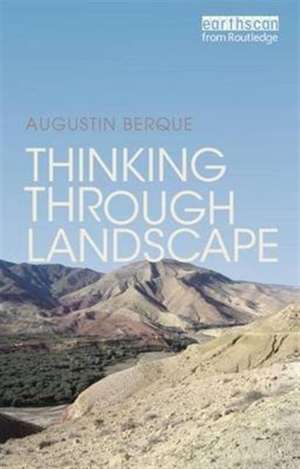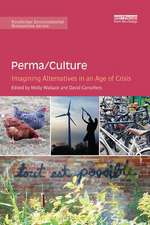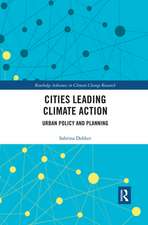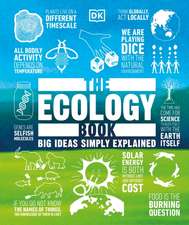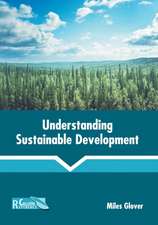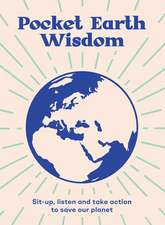Thinking through Landscape
Autor Augustin Berqueen Limba Engleză Hardback – 11 apr 2016
Berque locates the start of this change in human labour and urban elites being cut off from nature. Nature became an imaginary construct masking our real interaction with the natural world. He argues that this gave rise to a theoretical and literary appreciation of landscape at the expense of an effective practical engagement with nature. This mindset is a general feature of the world's civilizations, manifested in similar ways in different cultures across Europe, China, North Africa and Australia. Yet this approach did not have disastrous consequences until the advent of western industrialization.
As a phenomenological hermeneutics of human societies’ environmental relation to nature, the book draws on Heideggerian ontology and Veblen’s sociology. It provides a powerful distinction between two attitudes to landscape: the tacit knowledge of earlier peoples engaged in creating the landscape through their work - “landscaping thought”- and the explicit theoretical and aesthetic attitudes of modern city dwellers who love nature while belonging to a civilization that destroys the landscape - “landscape thinking”.
This book gives a critical survey of landscape thought and theory for students, researchers and anyone interested in human societies’ relation to nature in the fields of landscape studies, environmental philosophy, cultural geography and environmental history.
| Toate formatele și edițiile | Preț | Express |
|---|---|---|
| Paperback (2) | 254.25 lei 6-8 săpt. | |
| Taylor & Francis – 14 oct 2024 | 254.25 lei 6-8 săpt. | |
| Taylor & Francis – 8 aug 2014 | 356.20 lei 6-8 săpt. | |
| Hardback (2) | 992.38 lei 6-8 săpt. | |
| Taylor & Francis – 11 apr 2016 | 992.38 lei 6-8 săpt. | |
| Taylor & Francis – 4 apr 2013 | 1047.97 lei 6-8 săpt. |
Preț: 992.38 lei
Preț vechi: 1210.21 lei
-18% Nou
Puncte Express: 1489
Preț estimativ în valută:
189.95€ • 206.40$ • 159.66£
189.95€ • 206.40$ • 159.66£
Carte tipărită la comandă
Livrare economică 21 aprilie-05 mai
Preluare comenzi: 021 569.72.76
Specificații
ISBN-13: 9781138172272
ISBN-10: 1138172278
Pagini: 96
Dimensiuni: 138 x 216 x 11 mm
Greutate: 0.23 kg
Ediția:1
Editura: Taylor & Francis
Colecția Routledge
Locul publicării:Oxford, United Kingdom
ISBN-10: 1138172278
Pagini: 96
Dimensiuni: 138 x 216 x 11 mm
Greutate: 0.23 kg
Ediția:1
Editura: Taylor & Francis
Colecția Routledge
Locul publicării:Oxford, United Kingdom
Cuprins
Part 1: The Waves of History 1. Landscape and Thought 2. The Landscape without Landscape Architects 3. The Waves of History Part 2: The Earth, Acting on its Own 4. The Almond Tree, Barley and the Olive Tree 5. Earthly Leisure 6. The Countryside and the Obscure Female Part 3: The Third Day of the Third Month 7. The Cave with the Goat-foot 8. The Descent of the Tichka 9. The Witnesses to the Birth of the Landscape Part 4: They do not know how to look 10. Lunch on the Asqqif 11. The Quest for Authenticity 12. Xie Lingyun’s Principle Part 5: While having substance, it tends towards the Spirit 13. The Principle of Zong Bing 14. Down with Harmony! 15. Modern De-Cosmisation Part 6: Obscure Thing before it is said 16. From the Earth 17. The Profound Meaning of the Landscape 18. There is our Authenticity Part 7: Codicil 19. For Those Who Would Want to Overcome Modernity Conclusion: Landscape and Reality
Notă biografică
Augustin Berque is Professor at the EHESS, Ecole des Hautes Etudes en Sciences Sociales, University of Paris, France
Descriere
Our attitude to nature has changed over time. This book explores the historical, literary and philosophical origins of the changes in our attitude to nature that allowed environmental catastrophes to happen.The book presents a philosophical reflection on human societies’ attitude to the environment, informed by the history of the concept of landsca
